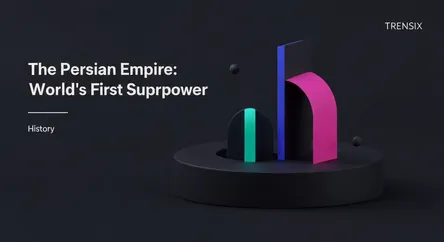History
The Persian Empire: World's First Superpower

Discover the Persian Empire, the world's first superpower founded by Cyrus the Great, and its lasting impact on global civilization and governance.
What is it?
The Persian Empire refers to a series of imperial dynasties centered in modern-day Iran, with the first and most influential being the Achaemenid Empire (c. 550-330 B.C.). Founded by Cyrus the Great, it became the largest empire in ancient history, stretching from the Balkan Peninsula in Europe to India's Indus Valley. At its peak, the empire governed over a significant portion of the world's population. The Achaemenid Empire was a global hub of culture, science, and technology, uniting vast and diverse territories under a centralized administration. It is renowned for its innovative governance, including a system of regional governors known as satraps, and its respect for local customs and religions.
Why is it trending?
The Persian Empire remains a topic of significant interest due to its pioneering role in establishing many principles of governance and infrastructure that are still relevant today. It was the world's first superpower, uniting three major sites of early human civilization: Mesopotamia, the Nile Valley, and the Indus Valley. Its model of a centralized, bureaucratic administration was revolutionary. The empire's emphasis on infrastructure, such as the creation of the Royal Road for communication and trade, and a reliable postal service, set a precedent for future civilizations. Furthermore, the legacy of tolerance, particularly under Cyrus the Great who is famed for freeing the Jewish people from Babylonian captivity, continues to be studied and admired.
How does it affect people?
The legacy of the Persian Empire profoundly affects modern society. Its administrative system of satrapies influenced the development of governmental structures in later empires. Innovations like the world's first major road network and postal system laid the groundwork for modern communication and transportation. The Persian emphasis on tolerance and multiculturalism provided an early model for governing diverse populations. Culturally, Persian art, architecture, and the concept of paradise gardens have had a lasting global influence. Concepts of human rights, exemplified by the Cyrus Cylinder, are considered an early declaration of principles that are fundamental to modern societies.